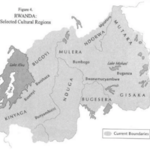Rwabugiri and Ijwi
The heroic figure of Mwami Kigeri Rwabugiri, king of Rwanda, dominates the history of the later nineteenth century in the Lake Kivu region, not only for Rwanda but for virtually all the neighboring countries to which he turned his prominence…
The Campaigns of Rwabugiri
Kigeri Rwabugiri, king of Rwanda from 1865 to 1895, transformed Rwandan kingship. As the last independent king of Rwanda before European intrusion, people remember him in monumental terms. Within the royal domains, he reconfigured internal power relations by appointing delegates…
The Two Traditions in Time Perspective
The first section discussed the differences in the forms of the two genesis traditions. The second discussed differences in the areas of residence, the histories, and the contacts with others sustained by the Baloho and Babambo, and speculated on the…
The Traditions as Historical Documents
The previous two sections have stressed the considerable differences in these two traditions. They appear mutually exclusive in content and narrative form, as well as in their distribution: those who know one tradition do not know the other. They therefore…
The Social and Historical Characteristics of the Two Clans on Ijwi
The previous section examined the content of each of the two traditions for its consistency and historical plausibility. Their differences can be explained in part by the fact that the two traditions are so localized on the island today; each…
The Two Traditions
The more complete, comprehensive, and geographically widespread tradition is that recounted primarily by informants of the Babambo tradition relates that at a hill called Nyabihunge, near the southern end of Lake Kivu, there occurred a succession struggle within the Havu…
Dual Genesis Traditions on Ijwi Island
Genesis traditions have longbeen important to historians of Africa, but recently interest in these forms of oral data has intensified with the development of analytic tools ultimately derived from structural anthropology. Where historians have applied these techniques, they have usually…
Lake Kivu Regional Trade In The Nineteenth Century
The debate on the relation of trade and markets in West Africa has only belatedly been taken up in East African historiography. For the most part this debate has focused on the origin of markets; the two most extreme positions…
Recent Historical Research in The Area of Lake Kivu
Rwanda and Zaïre The Rwandan Revolution of 1959–62 marked an important watershed not only for the history of the country but also for its historiography. Within Rwandan historical studies these political changes encouraged the development of a more broadly based…
Bushi and the Historians
Historiographical Themes in Eastern Kivu The form in which history is presented matters. Written historiographies in eastern Kivu were originally colonial historiographies: they drew on the cultural paradigms and intellectual assumptions of the colonial mindset, and they privileged themes important…






